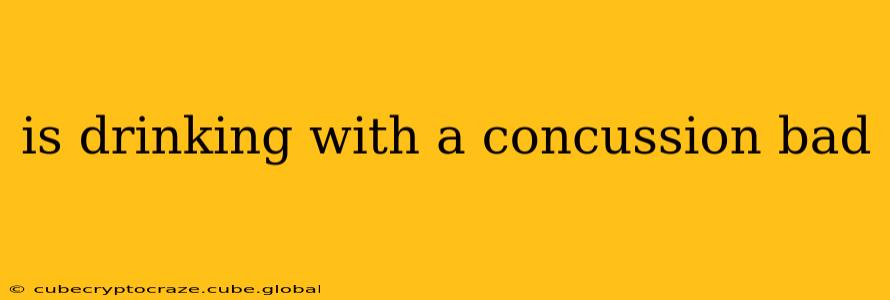Is Drinking Alcohol After a Concussion Bad? A Comprehensive Guide
A concussion, a type of traumatic brain injury (TBI), is a serious issue that requires careful management and rest to allow the brain to heal. One frequently asked question surrounding concussion recovery is whether alcohol consumption is safe. The short answer is a resounding no. Drinking alcohol after a concussion can significantly hinder the healing process and potentially worsen symptoms. Let's delve deeper into why.
Why is alcohol detrimental after a concussion?
Alcohol is a central nervous system depressant. This means it slows down brain activity. After a concussion, your brain is already vulnerable and working hard to repair itself. Introducing alcohol further depresses brain function, potentially prolonging recovery time and increasing the risk of complications.
What are the potential risks of drinking alcohol after a concussion?
-
Increased Inflammation: Alcohol can exacerbate inflammation in the brain, which is already present after a concussion. This heightened inflammation can prolong healing and contribute to more severe symptoms.
-
Delayed Recovery: Alcohol interferes with the brain's natural healing processes. This can lead to a longer recovery period, meaning symptoms like headaches, dizziness, and cognitive impairment may last longer.
-
Increased Risk of Seizures: In some cases, a concussion can increase the risk of seizures. Alcohol can lower the seizure threshold, making seizures more likely.
-
Exacerbated Symptoms: Existing concussion symptoms, such as headaches, nausea, dizziness, and cognitive difficulties, can be worsened by alcohol consumption. Even seemingly mild symptoms can be amplified.
-
Interaction with Medications: If you're taking medication for your concussion symptoms, alcohol can interact negatively with these drugs, potentially leading to adverse effects. Always consult your doctor before mixing alcohol with any medication.
How long should I avoid alcohol after a concussion?
There's no definitive timeframe for when it's safe to resume alcohol consumption after a concussion. It's crucial to consult your doctor or a healthcare professional. They can assess your individual case, considering the severity of your concussion and your overall health, to determine when alcohol might be safe. Generally, it's best to avoid alcohol until all concussion symptoms have completely resolved and you've received medical clearance.
What are the symptoms of a concussion?
Recognizing concussion symptoms is crucial for prompt medical attention and appropriate management. These can include:
- Headache
- Dizziness
- Nausea and Vomiting
- Blurred Vision
- Sensitivity to Light and Sound
- Confusion
- Memory Problems
- Balance Issues
- Fatigue
- Sleep disturbances
- Emotional changes (irritability, anxiety, depression)
What should I do if I suspect a concussion?
If you suspect you have a concussion, it's vital to seek medical attention immediately. A doctor can properly diagnose the injury and recommend appropriate treatment and recovery strategies. Following their recommendations meticulously is crucial for a successful recovery.
Can dehydration worsen concussion symptoms?
Yes, dehydration can worsen concussion symptoms. Staying well-hydrated is essential for brain function and recovery. Ensure you drink plenty of water throughout your recovery.
What is the best way to recover from a concussion?
Concussion recovery is highly individualized. Your doctor will create a personalized plan that might include rest, gradual return to activities, cognitive rehabilitation, and management of symptoms. Following your doctor's instructions is crucial for optimal recovery. Remember, patience is key.
In conclusion, avoiding alcohol after a concussion is non-negotiable. It poses significant risks to your recovery and overall well-being. Prioritize your health and consult your healthcare provider for personalized advice and guidance. Your brain's health is paramount.
